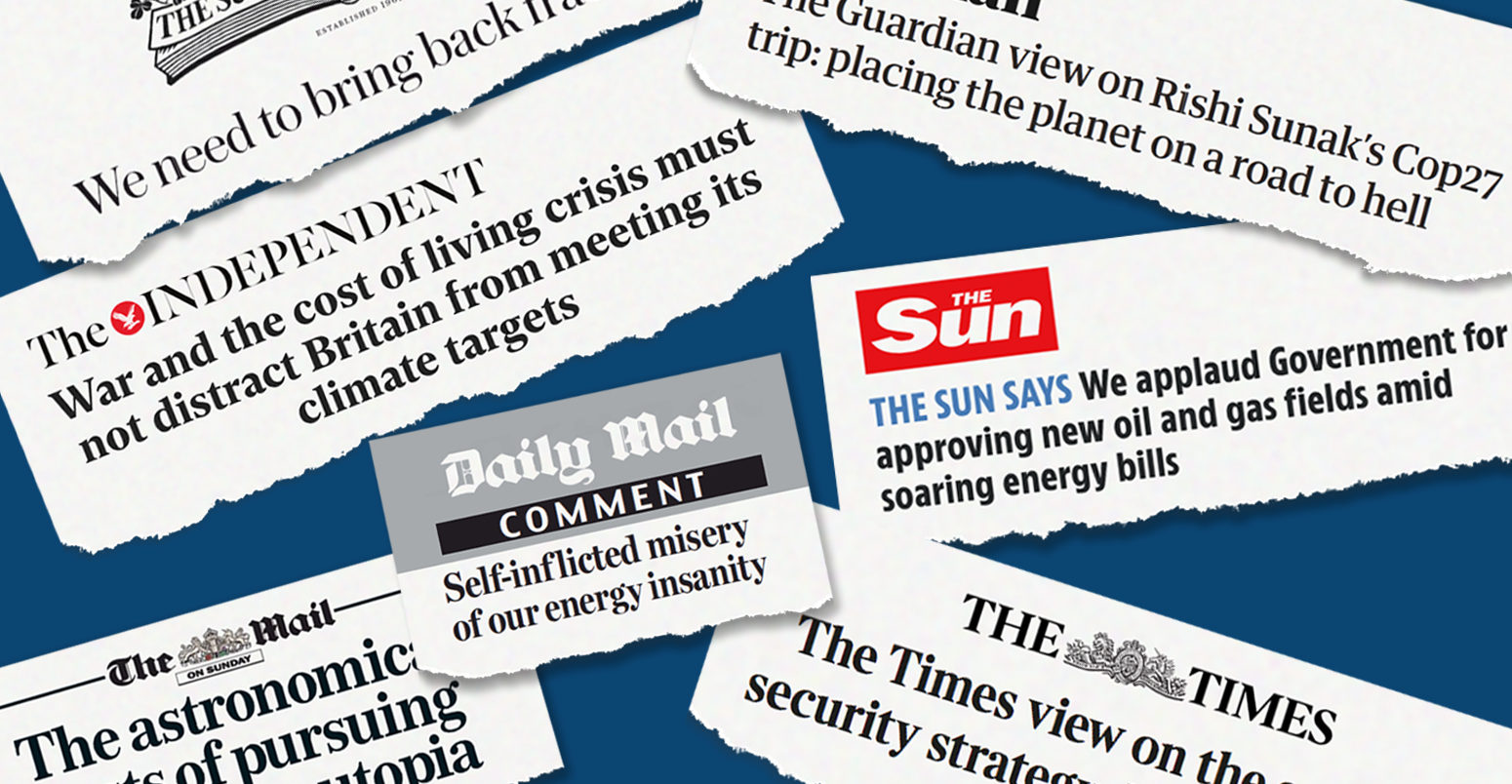
Analysis: How UK newspapers commented on energy and climate change in 2022
Multiple Authors
01.11.23Multiple Authors
11.01.2023 | 8:00amEnergy has frequently been at the top of the news agenda over the past year, after Russia’s invasion of Ukraine sent fossil-fuel prices – and, thus, the cost of living – soaring.
In response, the editorial pages of UK newspapers – which serve as the formal “voice” of the publications and are sometimes referred to as “leaders” or “leading articles” – have been filled with proposed solutions to the crisis.
Carbon Brief analysis of more than 400 climate- and energy-related newspaper editorials published in 2022 shows how some outlets have used the situation to push for fossil-fuel extraction, during a crisis caused almost entirely by rising fossil-fuel prices.
For example, it reveals unprecedented levels of lobbying by titles such as the Sun to reverse the government’s ban on fracking in England. This effort might have succeeded, were it not for the abrupt end to Liz Truss’s short spell as prime minister.
The popularity of nuclear power in the UK press also reached a record high in 2022. By contrast, support for renewables, such as wind and solar power, dipped, despite the vital role they are expected to play in weaning the UK off costly fossil gas.
This analysis builds on previous work published by Carbon Brief showing how the UK’s right-leaning newspapers had broadly been on a journey towards acceptance of climate policies over the past decade.
- Energy crisis dominates
- Record backing of fracking
- Shift away from climate action
- Targeting climate activists
- Methodology
Energy crisis dominates
Of the 413 climate- and energy-related editorials analysed by Carbon Brief in 2022, 149 addressed renewable energy, nuclear power and fracking – more than double the previous year.
The surge of interest in energy-related topics can be seen in the chart below. Nuclear power and fracking show the most dramatic upticks. (See: Record backing of fracking.)
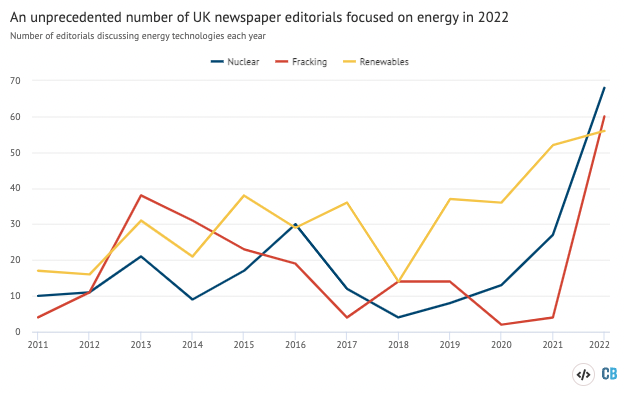
(Other energy-related issues, such as the proposed Cumbrian coal mine, are captured in Carbon Brief’s wider database of newspaper editorials, but were not part of this analysis.)
Predictably, the need to meet the UK’s energy demand with domestic sources was by far the most common reason for supporting all three of the technologies analysed.
Both fracking and nuclear power saw massive surges in support. In 2022, 46% of the energy-related editorials analysed spoke positively about nuclear power, the highest proportion ever recorded in Carbon Brief’s analysis.
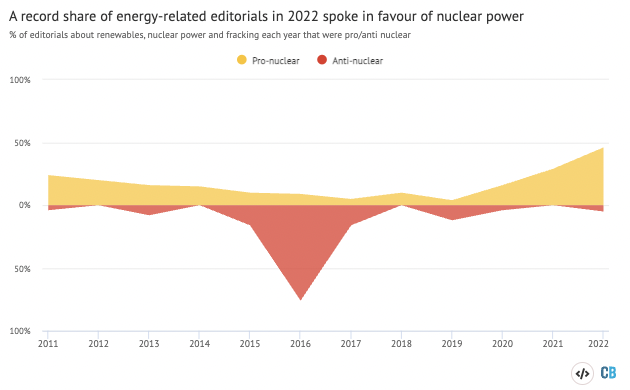
Support for nuclear power was seen across the ideological spectrum of newspapers, but was most common among right-leaning titles.
Newspapers such as the Daily Telegraph highlighted the need for new nuclear power, while taking the opportunity to criticise past Labour and Conservative-Liberal Democrat coalition governments for failing to invest in it.
(It is worth noting that many of these newspapers have been critical of UK nuclear efforts in the past, generally due to the high costs of construction of Hinkley Point C in Somerset.)
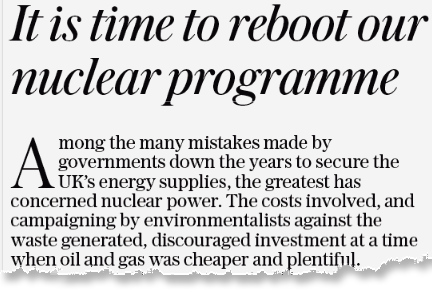
Unlike the other two technologies, support for renewables in energy-related editorials dropped slightly in 2022. The percentage of energy-related editorials that were pro-renewables fell from 57% to 38%, while the percentage of those that were anti-renewables increased from 7% to 15%.
This was largely due to right-leaning titles emphasising the “unreliability” of wind and solar power for providing the UK’s energy needs.

In fact, Carbon Brief’s analysis finds that, while 24 editorials explicitly recommended increasing UK gas extraction and 17 recommended nuclear power as solutions to the energy crisis in 2022, only six proposed building new renewable power capacity.
For a period at the start of the year, many right-leaning titles even suggested cutting “green levies” – which support low-carbon and social measures through people’s bills. For example, the Daily Mail ran an editorial in April titled: “Axe the green taxes.”
This was in spite of these levies making up just 3% of bills in October. Meanwhile, in August last year, the surge in UK wholesale gas prices since 2019 explained 96% of the increase in household energy bills, according to Carbon Brief analysis.
Record backing of fracking
Fracking for shale gas has consistently been more popular in the UK press than among the public. It has been banned in England since 2019, following extensive protests and minor earthquakes at drilling sites.
Yet, in 2022, right-leaning newspapers – especially the Sun, Daily Telegraph and Daily Mail – published unprecedented numbers of editorials praising fracking and calling for the ban to be overturned.
This can be seen in the chart below, with the Sun alone publishing more pro-fracking editorials in a single year than all UK newspapers combined have ever managed before – 32 in total.
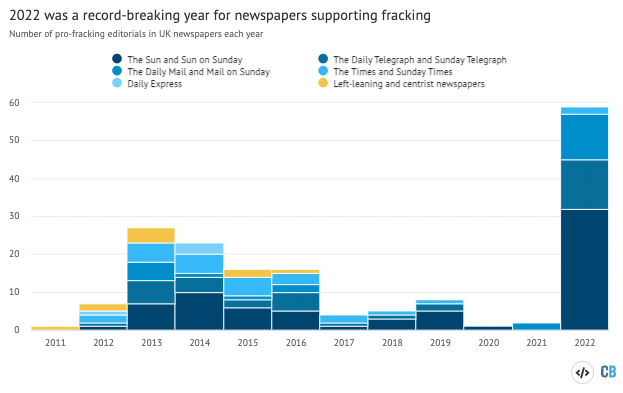
With headlines such as “frack backing”, “now frack on” and “hail shale”, again and again the Sun said the government “must lift the fracking ban” because “producing cheap gas from shale is our best bet”.
The practice was framed as a way to cut dependence on expensive gas from Russia and other foreign nations. By far the most common theme – appearing in 54 of the 69 editorials that mentioned fracking – was the need for shale gas to satisfy the UK’s energy needs.
In reality, extracting shale gas in the UK would be unlikely to yield significant benefits for either energy security or prices, especially in the short term.
However, the lobbying barrage from one the nation’s most-read newspapers may have had some impact.
While pre-energy crisis government polling suggested that just 17% of people in the UK supported fracking, more recent figures from autumn 2022 show this has risen to 25%, with energy security given as the biggest reason. (Support for renewable energy is much higher, at about 88%.)
The message also appeared to cut through to the government during Liz Truss’s short-lived spell as prime minister. She broke a manifesto pledge to overturn the fracking ban and was hailed by right-leaning newspapers for doing so.
However, this decision was soon reversed when Truss was replaced by the current prime minister Rishi Sunak.
Shift away from climate action
Overall, there were fewer editorials in UK newspapers focusing on climate change in 2022 – 126 compared to 185 the previous year. However, the number still remained at the relatively elevated level it has been at since 2018.
As the chart below shows, there was a fairly pronounced dip in support for climate action – and increase in opposition – among right-leaning titles. This was driven by a selection of articles in the Daily Mail, Sun, Daily Telegraph and their Sunday equivalents.
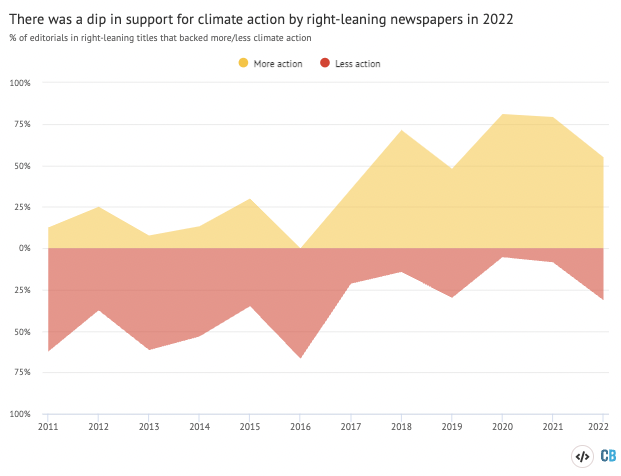
Notably, in contrast to a decade ago, 2022 marked the fourth year in a row that no editorials rejected either the existence of climate change or the science underpinning it.
Instead, criticism was reserved for a handful of pet topics among these right-leaning newspapers. These include the perceived high costs of pursuing climate policies and the “eco-idiot” protesters pushing for more ambitious climate action in the UK.
One notable editorial in the Mail on Sunday took aim at the “astronomical costs of pursuing a net-zero utopia”. It took the energy crisis, which is primarily the result of reliance on fossil fuels, as a cue to reassess the UK’s net-zero commitment.
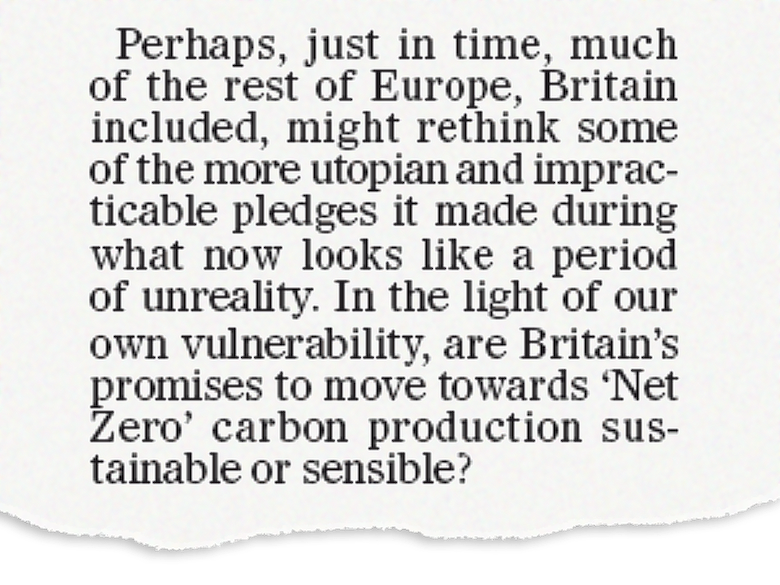
Another contentious topic for the Sun and the Daily Mail was the discussion at the COP27 climate summit around loss-and-damage finance – invariably described as climate “reparations”.
The concept was branded as “lunacy”, with the newspapers downplaying the UK’s contribution to historical emissions. The Sun also noted that Pakistan, one of the expected recipients of such funds after suffering flood damages of more than $30bn this year, “can afford nukes”.

Targeting climate activists
Around half of the editorials that pushed back against climate action did so by criticising those involved in it, especially climate protesters.
Activists were variously described by the UK’s right-leaning newspapers as “doomsday cult idiots”, “eco-anarchists”, “sociopaths” and “green extremists”.
Last year saw Just Stop Oil emerge on the scene as the latest group engaging in disruptive, non-violent direct action to push for more ambitious climate action. This has included blocking roads, sabotaging petrol pumps and spraying soup at works of art.
If one of the group’s goals was to attract media attention they have been successful.
Carbon Brief analysis of the editorial database shows that, in its first year of operation, Just Stop Oil has attracted more outraged editorials in the UK’s right-leaning newspapers than even Extinction Rebellion managed amid its blockades in 2019.
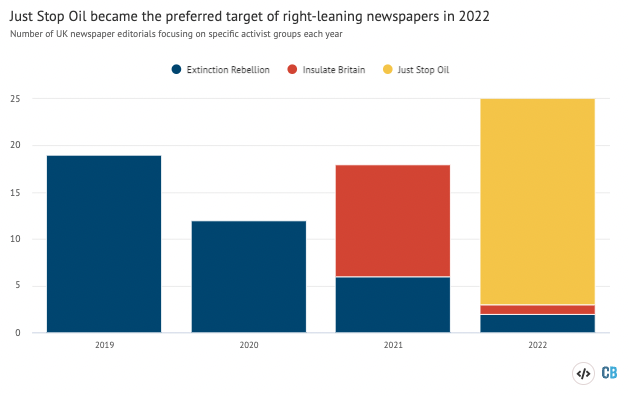
Methodology
This is a 2022 update of previous analysis conducted for the period 2011-2021 by Carbon Brief in association with Sylvia Hayes, a PhD researcher at the University of Exeter.
The full methodology can be found in the original article, including the coding schema used to assess the language and themes used in editorials concerning climate change and energy technologies.
The analysis is based on Carbon Brief’s editorial database, which is regularly updated with leading articles from the UK’s major newspapers.
-
Analysis: How UK newspapers commented on energy and climate change in 2022



